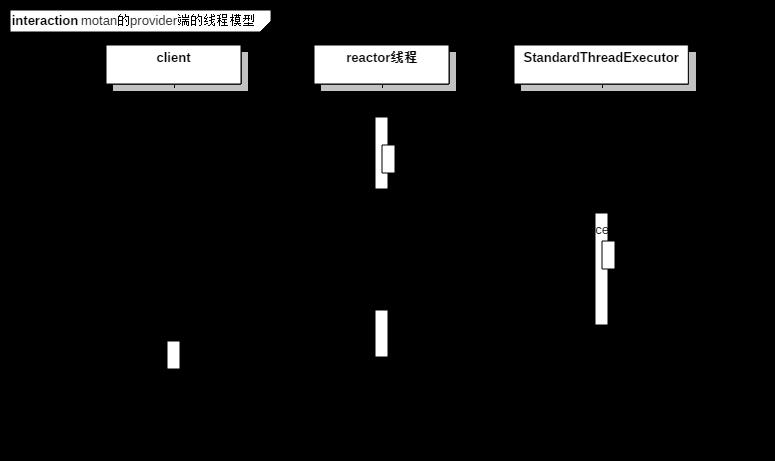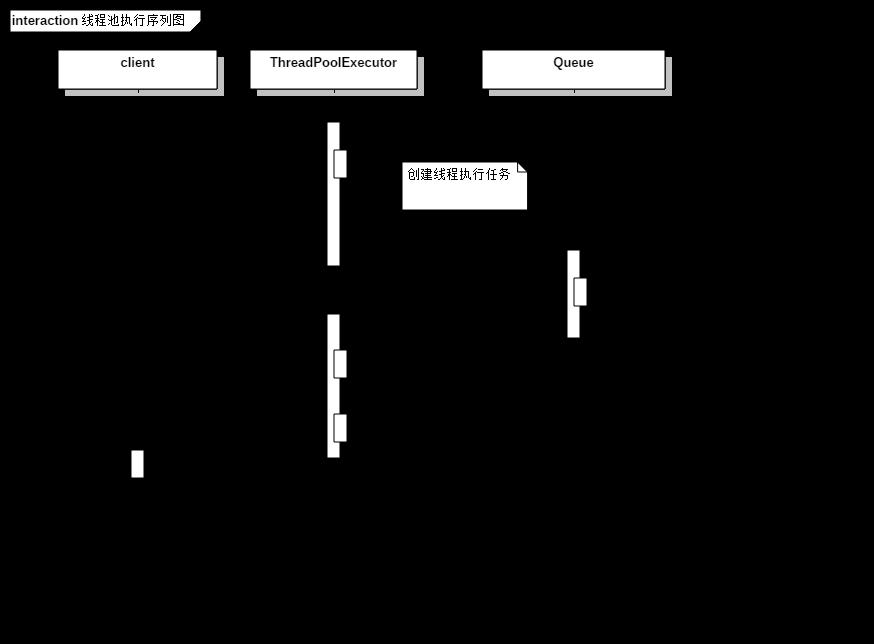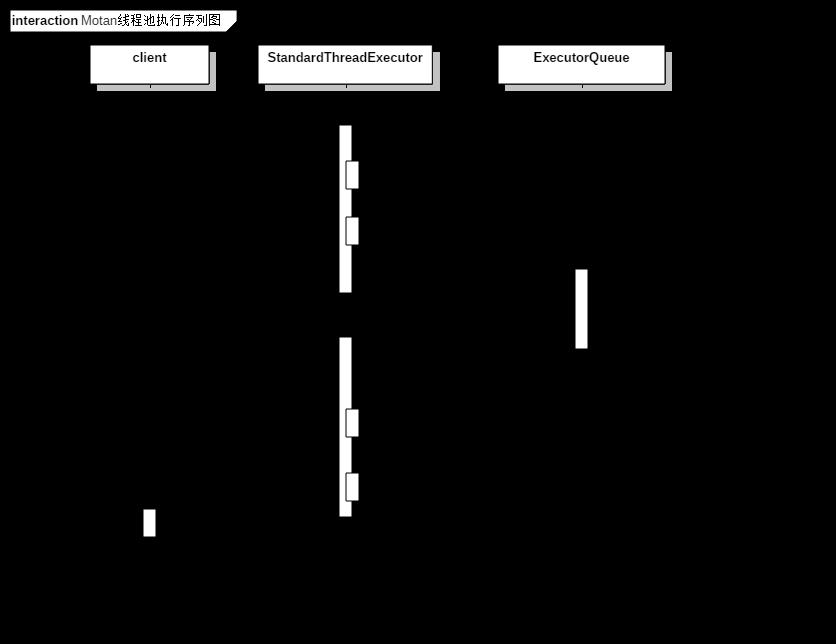Motan在服务provider端用于处理request的线程池
Posted huangll99
tags:
篇首语:本文由小常识网(cha138.com)小编为大家整理,主要介绍了Motan在服务provider端用于处理request的线程池相关的知识,希望对你有一定的参考价值。
最近开始重新看motan的源码,打算花一年的时间来分析每个模块每个功能的代码实现,坚持写一个motan分析系列。
因为没有思路,只能一个片段一个片段的看,等到有了一定的积累,再将看过的代码串起来一起分析,形成完整的思路。
第一篇是要回答自己的一个疑问,motan在服务provider端的线程模型是什么?request到达服务provider端之后,被哪个线程处理?
motan的tcp通信框架用的是netty,netty的线程模型是reactor模型。由一个Acceptor线程负责channel的接入,然后交给reactor线程来负责这个channel的读写事件。
所以一个request到达provider端,首先是由reactor线程来处理,进行解码,解码成java的request对象。这个时候就有一个问题,一般我们的服务都是要访问数据库等资源的,会存在IO的阻塞,如果我们直接在reactor线程处理request请求,就会阻塞住reactor线程,使得reactor无法处理其他channel的读写事件,也就无法达到高的并发。因此我们使用一个线程池来处理request。
motan的代码:
public class NettyChannelHandler extends SimpleChannelHandler {
private ThreadPoolExecutor threadPoolExecutor;
......
private void processRequest(final ChannelHandlerContext ctx, MessageEvent e) {
final Request request = (Request) e.getMessage();
request.setAttachment(URLParamType.host.getName(), NetUtils.getHostName(ctx.getChannel().getRemoteAddress()));
final long processStartTime = System.currentTimeMillis();
// 使用线程池方式处理
try {
threadPoolExecutor.execute(new Runnable() {
@Override
public void run() {
processRequest(ctx, request, processStartTime);
}
});
} catch (RejectedExecutionException rejectException) {
DefaultResponse response = new DefaultResponse();
response.setRequestId(request.getRequestId());
response.setException(new MotanServiceException("process thread pool is full, reject",
MotanErrorMsgConstant.SERVICE_REJECT));
response.setProcessTime(System.currentTimeMillis() - processStartTime);
e.getChannel().write(response);
LoggerUtil
.debug("process thread pool is full, reject, active={} poolSize={} corePoolSize={} maxPoolSize={} taskCount={} requestId={}",
threadPoolExecutor.getActiveCount(), threadPoolExecutor.getPoolSize(),
threadPoolExecutor.getCorePoolSize(), threadPoolExecutor.getMaximumPoolSize(),
threadPoolExecutor.getTaskCount(), request.getRequestId());
}
}
它的流程是这样:

Motan在处理request的时候并没有直接使用JDK的线程池,而是继承ThreadPoolExecutor进行了自定义实现。
StandardThreadExecutor 的实现代码:
public class StandardThreadExecutor extends ThreadPoolExecutor {
public static final int DEFAULT_MIN_THREADS = 20;
public static final int DEFAULT_MAX_THREADS = 200;
public static final int DEFAULT_MAX_IDLE_TIME = 60 * 1000; // 1 minutes
protected AtomicInteger submittedTasksCount; // 正在处理的任务数
private int maxSubmittedTaskCount; // 最大允许同时处理的任务数
.......
public StandardThreadExecutor(int coreThreads, int maxThreads, long keepAliveTime, TimeUnit unit,
int queueCapacity, ThreadFactory threadFactory, RejectedExecutionHandler handler) {
super(coreThreads, maxThreads, keepAliveTime, unit, new ExecutorQueue(), threadFactory, handler);
((ExecutorQueue) getQueue()).setStandardThreadExecutor(this);
submittedTasksCount = new AtomicInteger(0);
// 最大并发任务限制: 队列buffer数 + 最大线程数
maxSubmittedTaskCount = queueCapacity + maxThreads;
}
public void execute(Runnable command) {
int count = submittedTasksCount.incrementAndGet();
// 超过最大的并发任务限制,进行 reject
// 依赖的LinkedTransferQueue没有长度限制,因此这里进行控制
if (count > maxSubmittedTaskCount) {
submittedTasksCount.decrementAndGet();
getRejectedExecutionHandler().rejectedExecution(command, this);
}
try {
super.execute(command);
} catch (RejectedExecutionException rx) {
// there could have been contention around the queue
if (!((ExecutorQueue) getQueue()).force(command)) {
submittedTasksCount.decrementAndGet();
getRejectedExecutionHandler().rejectedExecution(command, this);
}
}
}
public int getSubmittedTasksCount() {
return this.submittedTasksCount.get();
}
public int getMaxSubmittedTaskCount() {
return maxSubmittedTaskCount;
}
protected void afterExecute(Runnable r, Throwable t) {
submittedTasksCount.decrementAndGet();
}
}
这里是重写了ThreadPoolExecutor的execute和afterExecute方法。一个需要非常注意的地方是使用了一个ExecutorQueue作为BlockingQueue.
我们来看ExecutorQueue的代码实现:
/**
* LinkedTransferQueue 能保证更高性能,相比与LinkedBlockingQueue有明显提升
*
* 1) 不过LinkedTransferQueue的缺点是没有队列长度控制,需要在外层协助控制
*/
class ExecutorQueue extends LinkedTransferQueue<Runnable> {
private static final long serialVersionUID = -265236426751004839L;
StandardThreadExecutor threadPoolExecutor;
public ExecutorQueue() {
super();
}
public void setStandardThreadExecutor(StandardThreadExecutor threadPoolExecutor) {
this.threadPoolExecutor = threadPoolExecutor;
}
// 注:代码来源于 tomcat
public boolean force(Runnable o) {
if (threadPoolExecutor.isShutdown()) {
throw new RejectedExecutionException("Executor not running, can\'t force a command into the queue");
}
// forces the item onto the queue, to be used if the task is rejected
return super.offer(o);
}
// 注:tomcat的代码进行一些小变更
public boolean offer(Runnable o) {
int poolSize = threadPoolExecutor.getPoolSize();
// we are maxed out on threads, simply queue the object
if (poolSize == threadPoolExecutor.getMaximumPoolSize()) {
return super.offer(o);
}
// we have idle threads, just add it to the queue
// note that we don\'t use getActiveCount(), see BZ 49730
if (threadPoolExecutor.getSubmittedTasksCount() <= poolSize) {
return super.offer(o);
}
// if we have less threads than maximum force creation of a new
// thread
if (poolSize < threadPoolExecutor.getMaximumPoolSize()) {
return false;
}
// if we reached here, we need to add it to the queue
return super.offer(o);
}
}
ExecutorQueue实现了LinkedTransferQueue,主要是LinkedTransferQueue相比LinkedBlockingQueue等的队列有很大的性能提高。它的缺点是没有队列长度控制,容易发生内存溢出。所以motan的代码中,在execute(Runnable r)中对提交的任务数加一,在afterExecute中对提交的任务数减一,维护了一个正在运行的任务数,同时有一个最大任务数的限制。在提交任务的时候,如果任务数超过了最大任务数,对这个任务执行拒绝策略,以此实现了队列长度的控制。
另外在ExecutorQueue的实现中重写了offer方法,因为没有长度限制的LinkedTransferQueue的offer方法总是返回true,所以线程池中的线程数不会超过minThread。Motan的改动是在提交的任务数超过poolSize,而poolSize小于最大线程数的时候返回false,让executor创建线程。
最后用两张图来总结JDK的线程池与Motan线程池的执行流程:


以上是关于Motan在服务provider端用于处理request的线程池的主要内容,如果未能解决你的问题,请参考以下文章